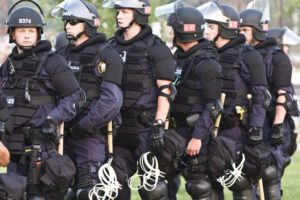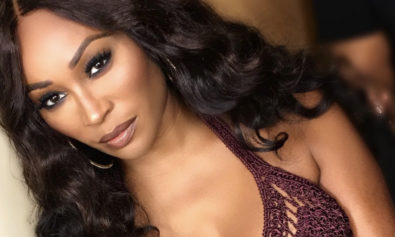
Riot Gear Police Lined Up | by Tony Webster (Source: Flickr)
Recently, John McNesby, the president of Philadelphia chapter of the Fraternal Order of Police (FOP), drew criticism for calling Black Lives Matter “a pack of rabid animals.” He made the remarks at a pro-police “Back the Blue” rally in support of a white officer who fatally shot David Jones, a Black man, in the back in June. McNesby, whose chapter joined the national FOP in endorsing Trump for president, once defended a white officer who wore a Nazi tattoo.
Founded more than a century ago, the FOP is the largest police union in the United States. Although the organization’s constitution stated that “race, Creed or Color shall be no bar,” recent positions by the FOP call into question its attitudes on civil rights, social justice and issues related to Black people.
From its inception, the FOP was not a part of the greater labor union movement, which despite its racial blind spots and history of racism, has taken stands in favor of racial justice. Historically, police have been used to control and employ violence against the “problem” segments of society, such as Black people — whether enslaved or emancipated — striking workers, radical protesters or others. The modern police union movement was formed as a response to the demands of the civil rights movement, complaints of police brutality and calls for police-community relations initiatives from the Black community, and cries of “law and order” from reactionary whites.
At the same time, Black police formed their own associations in the 1960s as a part of the civil rights movement, at a time when they faced racial discrimination from their colleagues in blue and there was an intersection between law enforcement and the Klan. It is because of this legacy of racism and segregation that some cities such as Dallas have separate police unions.
In Chicago, the FOP celebrates its history of brutality, including its legacy of violence against protesters at the 1968 Democratic National Convention. In an attempt to rewrite history, the local FOP proclaimed that “the time has come that the Chicago Police be honored and recognized for their contributions to maintaining law and order — and for taking a stand against Anarchy…The Democratic National Convention was about to start and the only thing that stood between Marxist street thugs and public order was a thin blue line of dedicated, tough Chicago police officers.” The Chicago FOP also fought against affirmative action and the efforts by the Afro American Patrolmen’s League to bring inclusion to the police force, and opposed a resolution making December 4 “Fred Hampton Day” after the slain Black Panther and police assassination victim.
In Detroit, the local Police Officers Association organized a police demonstration to oppose affirmative action in the 1970s. Similarly, in New York in 1992, the Patrolmen’s Benevolent Association (PBA) organized a demonstration of 10,000 officers, many drunken and racist, against the city’s Black mayor, David Dinkins. Some of the rally participants called Dinkins a “washroom attendant,” while others carried signs depicting him with swollen lips and a bushy Afro.
A fundamentally conservative organization, the FOP lobbies for the shielding of bad police officers, and opposes police reforms to hold law enforcement accountable. As police unions resist prosecution of brutal and criminal police officers who engage in excessive force and racial discrimination, they promote a debunked “war on police,” and seek hate crimes protections when officers are injured or killed, even equating the wearing of a blue police uniform with experiencing racism.
Fourteen states have a police bill of rights protecting police from criminal investigations and allowing 10 days after an incident before an officer must speak to authorities. Further, police unions have smeared the character of civilians who accuse the police of misconduct or are killed by police. Local unions have boycotted Beyonce and movie director Quentin Tarantino for their so-called “anti-police” positions, and have refused to provide security at football games where players sit down for the national anthem to protest police violence against Black victims.
When the 330,000 member FOP endorsed Trump for president, the organization said in a press release that “Mr. Trump has seriously looked at the issues facing law enforcement today. … He understands and supports our priorities and our members believe he will make America safe again.” The FOP also wrote a wish list for Trump’s first 100 days in office, which included such items as reversal of the Obama-era restrictions on military equipment for local and state law enforcement; repealing the ban on private prisons and racial profiling by the federal government; scrapping Obama’s policing reform recommendations; restricting aid to sanctuary cities; ending Deferred Action for Childhood Arrivals (DACA); reversing changes in U.S.-Cuba relations and extraditing Assata Shakur, and repealing Obamacare.
The national FOP support for Trump put the group at odds with many Black police officers and associations who have criticized Trump for his racism, sexism and homophobia, only further highlighting the divide between the majority-white law enforcement organization and the Black community.
“Is this endorsement a result of the surveying of the membership of individual unions that represent police officers or is this endorsement the result of a few individuals who may stand to benefit from a so-called law and order candidate who knows nothing about the criminal justice system and is opposed to basic reforms of the system?” read a statement from Blacks in Law Enforcement of America, encouraging Black cops and others to oppose Trump. “He has no record of anything positive concerning criminal justice issues and concerns of our community,” it added.


